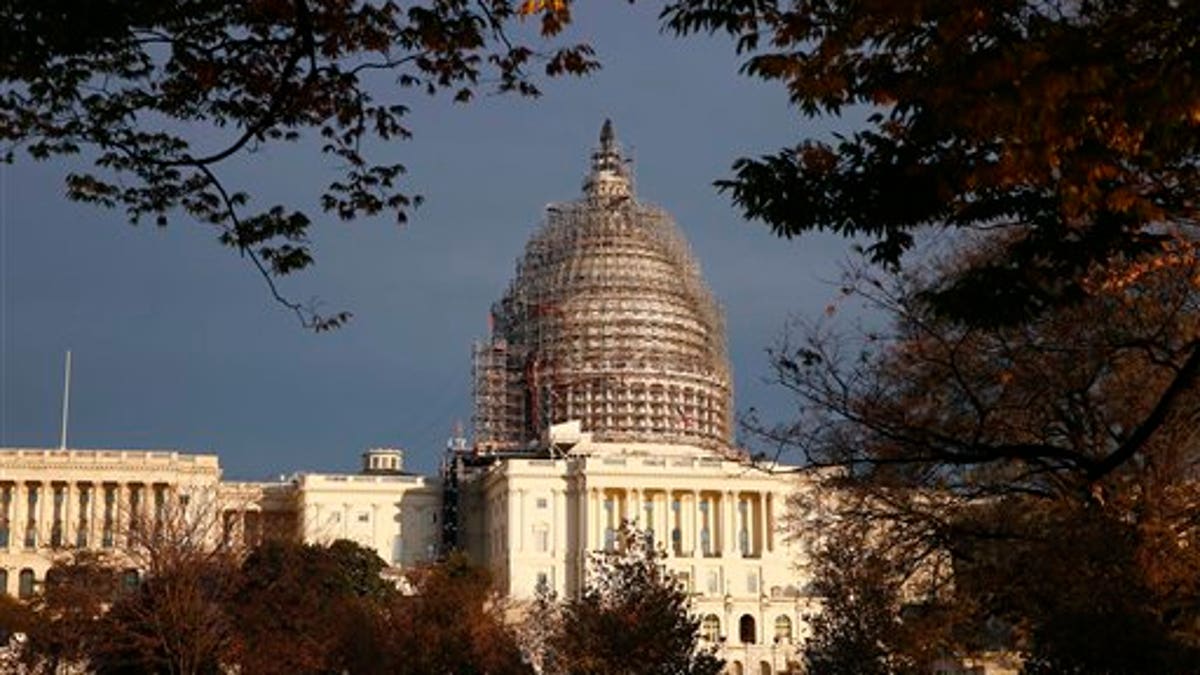
In this Nov. 22, 2015 file photo, the Capitol dome is seen on Capitol Hill. (AP)
Numbers are everything. They quantify and define.
Take the Star Wars canon. Episode V rocked. Episode I sucked. They’re back on track with Episode VII.
Turning 18 means something. So does turning 21.
And numbers can tell you a lot about the 114th Congress. Perhaps one number in particular. A digit that’s likely to be close to zero.
Despite all sorts of things to do on Capitol Hill this year and big expectations with a Republican majority in the Senate and new House Speaker Paul Ryan, Congress may wind up doing practically nothing.
Lawmakers will sure exert themselves on a range of issues. But many major legislative initiatives appear destined for hollow outcomes.
Most will look immediately at promises from Senate Majority Leader Mitch McConnell, R-Ky., and Senate Judiciary Committee Chairman Chuck Grassley, R-Iowa. They’ve erected a blockade against considering any Supreme Court nominee to succeed the late Antonin Scalia until the next president assumes office. Still, senators and the Obama administration will engage in an epic tussle.
Congress faces basically one “cliff” this year. Lawmakers must reauthorize the Federal Aviation Administration (FAA) by March 31. House Transportation Committee Chairman Bill Shuster, R-Pa., has authored a bill to re-up the FAA. The legislation would also privatize the nation’s air traffic control system.
Privatization of air traffic control operations is controversial. The controllers support it. Pilots oppose it. Most carriers, with the exception of Delta Airlines, are in favor. But there’s little hope Shuster’s bill will hit the floor.
Even if there was widespread support in the House to sign off on the privatization approach, there’s no speedy path through the Senate before the deadline. That means Congress must approve an interim extension – or face a partial shutdown of the FAA come April.
Repeal ObamaCare? That won’t happen as long as Mr. Obama is president. An alternative to ObamaCare? Ryan promises one this year. We’ve heard that before. A bill that can pass? That remains to be seen.
The House Budget Committee was scheduled this week to ink a spending blueprint for the year. But that budget isn’t quite ripe yet. The Budget Committee postponed a lengthy session to prep the budget slated for today until at least mid-March.
Ryan’s curbed expectations for passing a budget – despite extolling the virtues of budgeting during his years as Budget Committee Chairman. The problem is that conservatives want to torch a deal forged between President Obama and former House Speaker John Boehner. That accord established a spending topline for the next two years. Any move to blow up the Obama/Boehner agreement is sure to infuriate Senate Minority Leader Harry Reid, D-Nev. Ryan secured a promise from Reid to allow spending bills to come to the floor this year – but under the premise Congress adheres to the Obama/Boehner pact.
Ryan and House Budget Committee Chairman Tom Price, R-Ga., are challenged to find unity in GOP ranks to adopt a budget. If they stick to the Obama/Boehner number, they lose conservatives. If they drop the spending figure to court conservatives, moderates and defense hawks could vote no.
Ryan & company face an even stiffer climb this year – to say nothing of duplicity which lurks if they fail to approve a budget. They were apoplectic when the then-Democratic-controlled Senate repeatedly refused to approve a budget. If Republicans fail this time, they may cough up excuses and platitudes. But that won’t match the GOP’s holier-than-thou rhetoric emanating from the House when it approved Ryan’s budgets and the Senate took a pass.
Finally, there are appropriations bills to fund the government.
It helps if Congress OKs a budget ahead of time to establish spending allocations for each of the 12 appropriations bills. However, it’s not absolutely necessary. One of Congress’s most-influential tools to set policy lies in appropriations. Lawmakers can decide to flood various programs with money or dam it up in appropriations. That dictates a political outcome through legislating.
But …
If the House and Senate don’t both approve the same spending bills and earn Obama’s signature, then there’s not much congressional impact. A failure to finish all 12 bills by Oct. 1 (the start of Washington’s fiscal year) means the government either closes or Congress must approve an interim spending bill.
Stopgap bills are called Continuing Resolutions or “CR’s.” A CR simply renews the spending at current levels. If Congress can’t approve the appropriations bills themselves, lawmakers resort to an “omnibus” spending package. That’s where they glom all 12 of bills (and sometimes a few other things) into a massive legislative furball. It’s a take-it-or-leave-it proposition. And an omnibus dilutes legislative authority.
So perhaps a whole lot of nothing from Congress this year.
Except for perhaps two things: a CR sometime in September to sidestep a government shutdown and, later, an omnibus spending bill.
That could be it.
Numbers tell us a lot. And they do the same quantifying the 114th Congress.
Capitol Attitude is a weekly column written by members of the Fox News Capitol Hill team. Their articles take you inside the halls of Congress, and cover the spectrum of policy issues being introduced, debated and voted on there.




